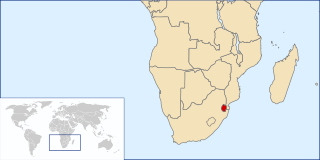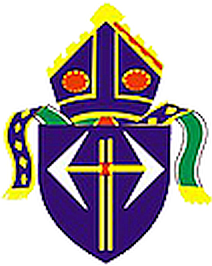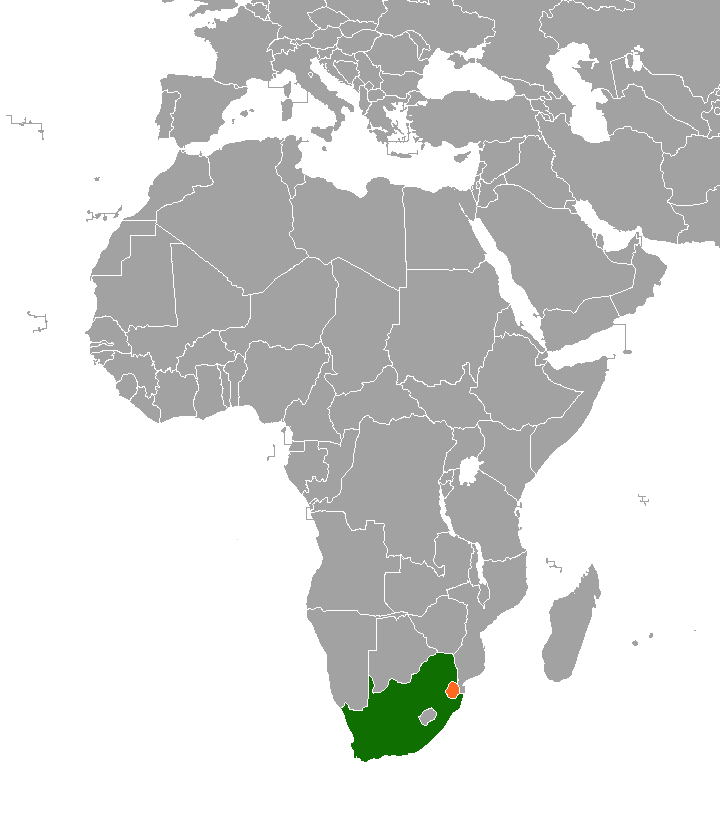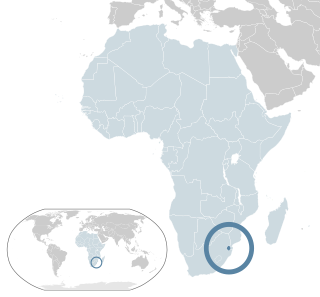Related Research Articles

Eswatini, officially the Kingdom of Eswatini, sometimes written in English as eSwatini, and formerly and still commonly known in English as Swaziland, is a landlocked country in Southern Africa. It is bordered by Mozambique to its northeast and South Africa to its north, west, and south. At no more than 200 kilometres (120 mi) north to south and 130 kilometres (81 mi) east to west, Eswatini is one of the smallest countries in Africa; despite this, its climate and topography are diverse, ranging from a cool and mountainous highveld to a hot and dry lowveld.

Artifacts indicating human activity dating back to the early Stone Age have been found in the Kingdom of Eswatini. Prehistoric rock art paintings date from c. 25,000 B.C. and continuing up to the 19th century can be found in various places around the country. The earliest known inhabitants of the region were Khoisan hunter-gatherers. Later, the population became predominantly Nguni during and after the great Bantu migrations. People speaking languages ancestral to the current Sotho and Nguni languages began settling no later than the 11th century. The country now derives its name from a later king named Mswati II. Ngwane, named for Ngwane III, is an alternative name for Swaziland the surname of whose royal house remains Nkhosi Dlamini. Nkhosi literally means "king". Mswati II was the greatest of the fighting kings of Eswatini, and he greatly extended the area of the country to twice its current size. The people of Eswatini largely belong to a number of clans that can be categorized as Emakhandzambili, Bemdzabu, and Emafikamuva, depending on when and how they settled in Eswatini.

Mswati III is the king of Eswatini and head of the Swazi Royal Family. He was born in Manzini in the Protectorate of Swaziland to King Sobhuza II and one of his younger wives, Ntfombi Tfwala. He was crowned as Mswati III, Ingwenyama and King of Swaziland, on 25 April 1986 at the age of 18, thus becoming the youngest ruling monarch in the world at that time. Together with his mother, Ntfombi Tfwala, now Queen Mother (Ndlovukati), he rules the country as an absolute monarch. Mswati III is known for his practice of polygyny and currently has 15 wives. Although he is respected and fairly popular in Eswatini, his policies and lavish lifestyle have led to local protests and international criticism. Mswati III was also secretly funded and supported by the government of apartheid-era South Africa.

Sobhuza II, KBE was the Paramount Chief and later Ngwenyama of Swaziland for 82 years and 254 days, the longest verifiable reign of any monarch in recorded history. Sobhuza was born on 22 July 1899 at Zombodze Royal Residence, the son of Inkhosikati Lomawa Ndwandwe and King Ngwane V. When he was only four months old, his father died suddenly while dancing incwala. Sobhuza was chosen king soon after that and his grandmother Labotsibeni and his uncle Prince Malunge led the Swazi nation until his maturity in 1921. Sobhuza led Swaziland through independence until his death in 1982. He was succeeded by Mswati III, his young son with Inkhosikati Ntfombi Tfwala, who was crowned in 1986.
Swazi Express Airways was an airline based in Swaziland and owned by Steffen Air Charter Services.

Klein Vrystaat was a short-lived Boer republic in what is now South Africa.
Articles related to Eswatini include:

The Central Bank of Eswatini, is the central bank of Eswatini. It was established in April 1974 and is based in capital Mbabane. According to the bank's website, the bank's mission is to promote monetary stability and foster a stable and sound financial system. Among the bank's responsibilities are managing Eswatini's foreign exchange position and safeguarding the country's foreign reserves of cash. The bank conducts weekly auctions of 91-day Swazi treasury bills, through "primary dealer" Swazi banks. The current governor is Majozi Sithole.
The Eswatini national cricket team represents the Kingdom of Eswatini, a country in Southern Africa, in international cricket. The Eswatini national cricket team, which is administered by the Eswatini Cricket Association, became an affiliate member of the International Cricket Council (ICC) in 2007. The team, along with Cameroon, the Falkland Islands, and Peru, was promoted to affiliate status in 2007 by the ICC. In 2017, they became an associate member. Eswatini is also a member of the African Cricket Association. The Eswatini national cricket team would compete in the World Cricket League Africa Region and the ICC Africa Twenty20 Championship.

General elections were held in Swaziland on 19 September 2008 to elect the members of the House of Assembly. It was the first election under the new constitution introduced in 2006, and the first time that foreign observers were allowed to monitor an election in the country. It was observed by an Expert Team established by the Commonwealth Secretary-General at the request of the Elections and Boundaries Commission of Swaziland.

Christianity is the dominant religion in Eswatini. The relative prevalence percentages vary by source. According to Pew Research, over 88% of the total 1.2 million population of Eswatini express Christianity to be their faith, over 0.2% express no affiliation. According to the US State Department religious freedom report of 2012, local religious leaders estimate that 90% of Eswatini's population is Christian, 2% are Muslim, while under 10% belong to other religious groups. According to the CIA World Factbook, the distribution is 40% Zionist, 20% Roman Catholic, other Christians 30%, 2% Muslim and 8% other religions. In other sources such as Clay Potts, the religious demographics are 80% Christian, and 20% Islam and Traditional Swazi religion.

The cuisine of Eswatini is largely determined by the seasons and the geographical region. Staple foods in Eswatini include sorghum and maize, often served with goat meat, a very popular livestock there. The farming industry mainly depends on sugar cane, tobacco, rice, corn, peanuts, and the exportation of goat meat and beef. Many Swazis are subsistence farmers who supplement their diet with food bought from markets.

The Diocese of Swaziland is a diocese in the Anglican Church of Southern Africa. It was founded in 1968. It comprises the country of Eswatini. It is divided in three archdeaconries, Eastern, Southern and Western.

Eswatini–South Africa relations refers to the current and historical relationship between Eswatini and South Africa. South Africa surrounds Eswatini on the north, west and south. The two states share strong historical and cultural ties. Mutual High Commissions were established in Pretoria and Mbabane at the end of the apartheid era in 1994. Eswatini's High Commission in Pretoria is also cross-accredited to Botswana, Lesotho, Namibia, Zambia and Zimbabwe.
Ellinah Ntombi Wamukoya was a Swazi Anglican bishop.
Cannabis in Eswatini (Swaziland) is illegal; the herb is referred to as insangu in Swazi. The local strain is known as "Swazi gold" and commands a high price due to its reputation for potency.

The history of the Jews of Eswatini, formerly Swaziland.
Eswatini remained a British protectorate throughout World War II. As such, it fought alongside the Allies against the Axis. While no large scale battles or major military operations took place in or around Eswatini, the colony did supply the Allies with troops during the war. World War II was also responsible for several important domestic developments in Eswatini.

Eswatini–Turkey relations are the foreign relations between Eswatini and Turkey. The Turkish ambassador in Pretoria, South Africa is also accredited to Eswatini. Eswatini’s embassy in Brussels is also accredited to Turkey.
References
- ↑ Dlamini, Wonderboy (28 August 2014). "First Swazi Anglican Bishop's wife passes on". Swazi Observer. Retrieved 2015-08-12.
- ↑ Kumalo, R. Simangaliso (2013). Religion & Politics in Swaziland: The contributions of Dr J.B. Mzizi. AFRICAN SUN MeDIA. ISBN 978-1-920382-29-2.
| Anglican Church of Southern Africa titles | ||
|---|---|---|
| Preceded by Anthony Hunter | Bishop of Swaziland 1975-1993 | Succeeded by Lawrence Bekisisa Zulu |